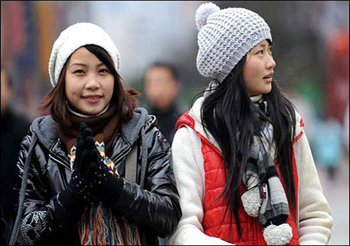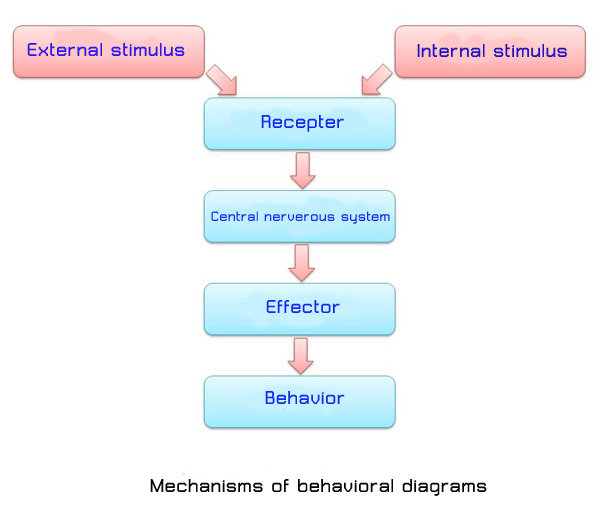
๐ HOME
๐ Mechanisms of behavior
๐ Inherited behavior
:: Orientation
:: Reflex
:: Chain of Reflex
๐ Learned Behavior
:: Habituation
:: Imprinting
:: Trial and Error
:: Conditioning
:: Reasoning
๐ Behavior and development of the nervous system
๐ Animal communication behavior
:: visual communication
:: sound communication
:: touch communication
:: chemical communication
๐ Question
Behavior
Behavior refers to act that expresses all forms of life in response to stimuli that occur both inside and outside an expression corresponding to the situation and environment, while it can be observed from the outside by a pattern of behavior. That results from the interaction of genes and environment.
 |
 |
| Expressive behavior when cold. | Expressive human behavior when it's hot. |
The study of animal behavior There are two types of
1. Physiological approach
Is intended to describe. Behavior in terms of the mechanism of the nervous system. This is a model and mechanism for student behavior. Lessons learned in Biology that.
2. Psychological approach
To study the effect of various factors around the body and internal factors that affect the development and expression. Behavior is clearly visible
Mechanical behavior
Behavior of the organism does or not is up to.
1. Motivation
The driving force for the behavior. People who are highly motivated Every effort to commit to the goal without relent. But people with low motivation is not perform the behavior. Or was aborted before the goal. Examples of motive of such traits include liking or not liking anything. Or it could be a matter of emotion, However, the motive may occur due to internal stimuli involved.
2. Stimulus
Stimuli or stimulus that causes behavior that has 2 types.
2.1 external stimuli is outside the body, the sensory organs. Can experience and recognize including Eyes, Nose, tongue and skin.
2.2 internal stimuli within the body is ready to appear as a result of behavior. Mechanism within the body, such as hunger, thirst, sexual desire excretion.
| For example, the relationship Motivation to stimuli or stimulus. |
---------------------------------------------------------------------------------------- from sample :: |
However, considering the motive, which is a matter of character and emotions can be complex and to study behavioral psychology. So let's just say that the lesson will focus on Noig. The mechanism causing this behavior as a result of physiology without the motive for analysis. |
 |
Examples of behavior ::
Mr. B when thirsty (Internal stimuli) overlooking the water contained in the bottle. (External stimuli), which stimulate the receptors sense the eye sends signals to the brain results. Brain to the spinal cord through the (Brain and spinal cord, the central nervous system) control arm, leg and trunk muscles.(Effectors) moved to the open water and drinking behavior.
Behavior is a complex one, depending on the level. The growth of the unit include
1. Recepter
2. Central Nerverous System
3. operational units (Effector)

